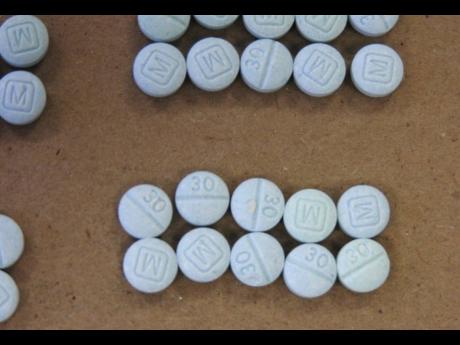PILL-POPPING PREDICAMENT
Cops want fentanyl, molly, other party drugs classified as dangerous to collar predators weaponising them to abduct, rape women
Hidden in the shadows of Jamaica’s nightlife amid a regulatory vacuum lurks a sinister trend: the use of synthetic drugs to prey upon and victimise women in their late teens to early 40s through drugging, rape, abduction and pornography.
This had led to urgent calls to the Government to end the unrestricted importation and usage of these substances as law enforcement finds itself shackled, unable to combat this growing menace effectively.
A confidential report shared with The Sunday Gleaner by a source with local and overseas connections noted the fears being expressed by officials.
“Jamaica’s failure to expedite the reclassification of dual-purpose synthetic pharmaceuticals such as fentanyl is presenting a grave threat to young and middle-age women who are increasingly becoming drugged, kidnapping and rape victims,” the report said.
As recently as March, several tins labelled as various food products were discovered to have contained synthetic drug tablets on arrival at a local port of entry.
More worrisome for campaigners is that when the pills arrive in Jamaica, they are often combined with other substances to make a more potent product for local consumption.
At least 14 cases of women being victimised have been documented in the island since the start of the year, leading to law enforcement officials raising the alarm again that “Jamaica is currently seeing an increase in the use of – and increased illegal importation of – synthetic drugs, which is a danger to the entire population”.
The report noted that symptoms associated with synthetic drug overdose include pale, cold, clammy skin; blue or purple lips and nails; respiratory arrest or slow breathing; extreme decreases in the level of consciousness; and limp or flailing arms and legs.
When analysed, blood or urine samples taken from victims “confirm cannabis, amphetamines and prescription stimulants or opioids such as fentanyl, cocaine, or ecstasy”, the report said.
Locally, victims have been found in hotel rooms, Airbnb rentals; bedrooms in homes of individuals unknown to them; and parked vehicles. In many cases, one investigator said, the women were reported missing by family members.
The most recent recorded case of synthetic drug abduction was a patron at an event two months ago. The victim woke up the following day in her car along a dead-end street surrounded by vomit. A medical examination later revealed she was raped.
“There is enough anecdotal evidence to us from the medical fraternity that subsequent to many entertainment events, their medical practices are seeing a rush of young and middle-aged ladies relaying stories of locations where they found themselves without knowing how they got where they were found, or who took them there,” a source with knowledge of the cases told The Sunday Gleaner.
Push for reclassification
An investigator, who spoke with The Sunday Gleaner on condition of anonymity, having not been authorised to speak on the matter, said that since 2022, the police and advocates have been lobbying the Government to reclassify the dual-purpose synthetic drugs as the dangerous weapons they have become. A reclassification would empower the authorities to make arrests and prosecute offenders.
The overseas-based Sunday Gleaner source lamented that despite warnings from Jamaica’s global partners on the dangers of synthetic and other party drugs, “no tangible action has been taken to do a reclassification on this island”.
The police want synthetic drugs such as fentanyl, ecstasy, and molly to be classified as dangerous drugs like cocaine, for which individuals can be charged and face heavy penalties. They also want sanctions for those caught illegally importing the substances.
A drastic increase in opioid overdose deaths in the United States in recent years is largely due to fentanyl poisoning. Just 2mg of the drug – less than half the size of a grain of rice – can prove fatal to a human.
Deputy Police Commissioner Fitz Bailey, who is in charge of the crime portfolio in the Jamaica Constabulary Force, said the police have been pressing the Government for a change in the classification of synthetic drugs.
“There is no doubt that we have been lobbying for the legislative changes to capture synthetic drugs. There is no current law [against] it. Our Dangerous Drugs Act doesn’t cover it. There needs to be significant amendment to the Dangerous Drugs Act,” he told The Sunday Gleaner.
One source questioned Jamaica’s inertia, noting that the health minister can make changes by ministerial order.
“The health minister, by ministerial order, has the power to update the list of drugs classified as dangerous under the Dangerous Drugs Act. This does not have to go to Parliament. Once the minister does it, the police can arrest persons caught with it in their possession under the act,” the source noted.
When contacted, Health Minister Dr Christopher Tufton said that discussions are currently under way to bring about a change.
“I am confirming that discussions have taken place to do this (reclassification). We are coordinating with the ministries of Justice and Legal and Constitutional Affairs to draft this new position,” he said while expressing hope for a position soon.
Justice Minister Delroy Chuck, however, said he was unaware of any such discussion, but noted that talks could have been held without his knowledge.
Traumatised by abuse, boosting awareness
Uki Atkinson and Felicia Francis Campbell presented the Jamaica situation in April at the Synthetic Drugs Conference in Mexico.
Atkinson, the research analyst at the National Council on Drug Abuse (NCDA), confirmed much of what Sunday Gleaner sources said.
Jamaica’s report at the conference included information that in 2019, a businessman was found dead in a local hotel room with four sets of tablets in his pocket. The pills contained caffeine such as cathinones and piperazines, which mimic traditional stimulant drugs such as ecstasy, and hallucinogens, for example, lysergic acid and diethylamide, but may have residual stimulant activity.
“There is clear evidence from toxicology analyses that fentanyl and other synthetic drugs are found in individuals here. That is not to be interpreted as deaths from drugs overdoses by fentanyl, but rather to establish its use here, whether from prescriptions or illegal means,” the report co-authored by Atkinson said.
Speaking with The Sunday Gleaner, she said many of the victimised women are further traumatised when videos of the abuse are uploaded on the web.
“Some of the victims only realise what was done when videos of them appear online. They realise they were gang-raped and videotaped and a video appears online. They have no recollection of how it happened. For some, they were drugged by the persons they hung with, and others by persons they don’t know, after going to some event and consuming alcoholic beverages,” she explained.
Atkinson noted that the NCDA does not have an investigative capacity.
“We are not law enforcement. We are about public education, research and prevention,” she said.
“But we have had to include a different spin on our public education based on what is happening now,” she said, noting that previously, the focus was on traditional drugs such as cannabis, tobacco, alcohol, and cocaine, to a lesser extent.
She said the advent of pill-popping MDMAs (ecstasy and molly), which are often mixed with adulterants such as fentanyl, has impacted the NCDA’s advocacy and public education campaigns.
“The presence of the synthetic drugs is more than a clear and present danger,” Atkinson said.
“We are at a high risk of these drugs entering our shores, becoming popular, and then individuals don’t really know what they are consuming, and people taking advantage of them,” she pointed out.
A May 2022 rapid assessment on substance use in schools highlighted the frequency of party drug use. It resulted in heightened surveillance at the island’s ports in 2023 to prevent the entry of synthetic drugs, to include fentanyl. Nonetheless, Jamaica is now seeing an increase in the illegal importation and use at entertainment events, the conference was told.
The NCDA, too, is hopeful for a reclassification.
“It’s not only those dual-purpose synthetic drugs that we need to put under our Dangerous Drugs Act,” said Atkinson. “Amend the law so that when somebody goes to a school and sells 70 children a cannabis-infused sweet, [that person can be severely punished]. Right now, if the person is caught, he or she cannot be charged under the Dangerous Drugs Act because the act is limited to Delta-9 tetrahydrocannabinol (THC) and doesn’t include Delta-8 THC, which is often used in edibles and synthetic cannabis products. So the list needs to be expanded to cover a broader range of cannabis components,” Atkinson stated, labelling fentanyl as being “in a class by itself”.
Synthetic drugs and the health sector
The Sunday Gleaner was also told that many cases are not reported and there are no clear reporting channels for patients who present at public health facilities with party-drug issues. At least one health facility has no reporting protocol with local health authorities.
Information from one Corporate Area hospital indicated that in the first three months of 2024, increased numbers of psychotic cases were seen in its accident and emergency department, with one week standing out as there were more such cases than “stabbing and gunshots”.
“While it is possible that synthetic drugs could be involved, we are still not discounting the COVID-19 mental health issues. But further examinations revealed narcotics-induced psychosis from drug overdose after some entertainment event,” said a hospital source.
Dr Delroy Fray, clinical coordinator at the St James-based Cornwall Regional Hospital, said he was unaware of synthetic drug cases presenting at the hospital post-large entertainment events, but noted that if private medical help is sought after such occurrences, the hospitals would not necessarily be aware.
SUPERVISED USE BENEFICIAL
Despite the ills, one Sunday Gleaner source acknowledged that under supervision, there are benefits to using the drugs that are now of concern.
“These opioids are pharmaceuticals and so there are intrinsic benefits with the use of these synthetic drugs/opioids as pain relievers associated with certain health conditions, which require powerful painkillers. However, these synthetic opioids when abused for pleasure are existential threats to human health due to their addictive nature,” the source said.
“The negative consequences of synthetic drugs used by individuals seeking pleasure always increase a country’s death rate exponentially. Therefore, as Jamaica grapples to eliminate gun and gang murders, any increased synthetic drug overdose becomes an additional real threat to our national security from economic and health perspectives.”
The potentially deadly fentanyl
The drastic increase in opioid overdose deaths in the United States is largely due to fentanyl poisoning.
Illegal fentanyl is cheaper than most other drugs on the streets and is being intentionally substituted into cocaine, heroin, methamphetamines and other drugs to make more money and get people hooked.
The drugs may look authentic, but there’s no way of knowing the contents. Sometimes drug dealers don’t even realize they are selling contaminated drugs.
According to the United States Drug Enforcement Administration, nearly half of illegal pills tested for fentanyl contained lethal quantities of fentanyl.
Fentanyl is a powerful and highly addictive opioid similar to morphine but about 50 to 100 times more potent.
It doesn’t take much Fentanyl to cause a fatal reaction. Let’s put this into perspective:
• A lethal dose of Fentanyl for an average person is considered to be about 2 milligrams.
• A lethal dose of cocaine starts at about 1000 milligrams.
• A grain of rice is approximately 25 milligrams.
• Anesthesiologists typically administer .05 to .5 milligrams of Fentanyl for a surgery depending on the type of surgery.
Source: https://medicine.okstate.edu/




